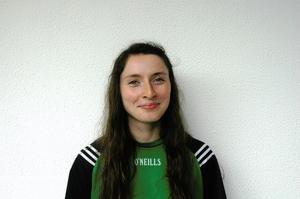Early Career Microbiologist of the Year competition – Alison Graham

Alison Graham
What are your current research interests?
I have a keen interest in environmental microbiology, sustainability, and the rumen microbiome. My current research focuses on reducing enteric methane emissions from cattle via their diet, by way of oxygen-releasing compounds as ruminant feed additives. This involved the development, in-vitro, and in-vivo assessment of a range of oxygen-releasing compounds. I evaluate their capacity to effectively mitigate methane emissions without negatively affecting important rumen processes, such as hydrolysis or feed fermentation.
I am also extremely passionate about the promotion of effective science communication. I actively volunteer as a facilitator and team leader with ‘Cell EXPLORERS’, a science outreach programme at the University of Galway.
What inspired you to go into this field of work?
There is an urgent need to develop innovative strategies to slow the impact of climate change. A multitude of approaches will be required to effectively meet our global greenhouse gas reduction targets. It won’t be a “one silver bullet” approach, but rather everyone working together to find a range of suitable synergistic solutions. I am interested in strengthening the lines of communication between scientists, farmers and agricultural stakeholders, in a collaborative effort to maintain transparency and foster an open dialogue. This would ensure that real-world insights are routinely shared and incorporated into our mitigative solutions, such that administering a ruminant feed additive at farm-scale could be easily incorporated into every-day farming life.
How has getting involved with Microbiology Society activities benefited your professional development?
As I near the end of my PhD journey, I have been eager to develop skills such as chairing to aid my transition from PhD to post-doc, as well as further my understanding of successful and accessible scientific communication within a conference setting. I had the opportunity to co-chair the microbiome sessions at The Microbiology Society Annual Conference 2025 and the regional meeting of the Irish division in Athlone. I thoroughly enjoyed both experiences. As a result, I had the invaluable experience of learning first-hand from more experienced co-chairs, while building connections with researchers from different scientific backgrounds. Attending Annual Conference also provided me with the opportunity to receive constructive feedback on my presentation and poster skills, to develop a wider research network, and further my understanding of the different roles within the Microbiology Society.
What hopes do you have for the future of your research field?
I hope my field of research continues to move towards addressing the 13th UN 2030 sustainable development goal of climate action, with a long-term commitment to meeting future reduction targets. The development of a slow-release ruminant feed additive would permit the continued suppression of methane at pasture, significantly reducing Ireland’s agricultural methane emissions. I hope for the continued fostering of a collaborative environment between the farming and scientific communities. I hope to see further strides in both bridging the information gap between the scientific community and the general public and making data in this field more transparent and accessible for consumers. Finally, I hope the global attitude surrounding climate change moves from a sense of hopelessness and apathy to one of optimism and action.
What do you love most about your job?
I have loved the opportunity to develop my skills as a microbiologist over the course of my PhD. I continually push myself out of my comfort zone, in order to improve as a scientist and to grow as a person. The dual-opportunity to set up and operate rumen-simulating bioreactors, and work with living bioreactors (cows!), has been extremely rewarding. I have also greatly valued the opportunity to be trained by, and to learn from my mentors, who have guided me during my research career. I deeply appreciate that I get to work with such an encouraging team of people in Galway, who not only challenge me to be better, but also push me to be curious.
